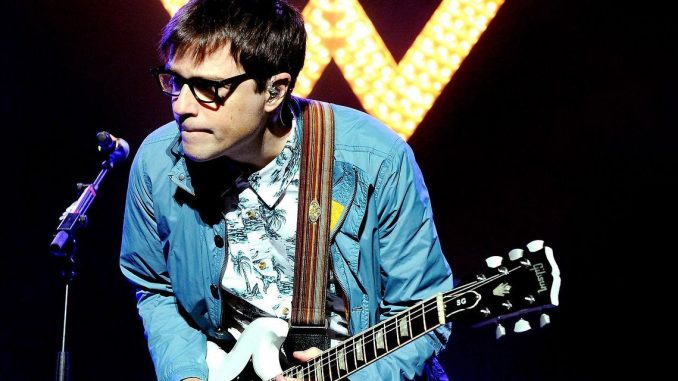
In the late 1960s, Joan Crawford’s later years as an actress, she guest-starred on a CBS daytime soap opera called “The Secret Storm,” temporarily filling in for her daughter who had taken ill. At the time, Crawford was in her 60s, and her daughter Christina was 29. Yet still, for four episodes, Crawford portrayed the youthful Joan Borman Kane with not a hint of irony or self-awareness. Sometimes I think about that, and I wonder what it would have been like to follow that series during the ‘60s and witness Kane age 40 years over the course of a day without any sort of acknowledgement.
If Blue Album and Pinkerton are Crawford’s golden years as an actress, then Pacific Daydream, Weezer’s eleventh studio album, is Crawford in “The Secret Storm.” It’s been 25 years since Weezer first formed, and Pacific Daydream is perhaps their most unconvincing attempt to pretend they’re as young as they once were. Frontman and songwriter Rivers Cuomo can’t seem to occupy a space other than the kinetics of the band’s youth, and as they move further and further away from their golden years, their unique brand of geeky angst tends to sound more and more manufactured.
That’s not to say that the album is just another Weezer album. There’s a clear sense of deviation here, a heavy accentuation of the pop in pop punk. In just about every way, Pacific Daydream is the anti-Pinkerton: overly polished, unadventurous and devoid of personality. Its mediocrity isn’t achieved through ineffective audaciousness like Red Album—chock full of Southern country twang, synthesizers and rap vocals that simply never work—but rather an unwillingness to engage beyond the veneer of shiny Top 40 pop. On “Feels Like Summer,” Cuomo’s effects-heavy voice sounds more robotic than human; the pop punk guitar riffs on the latter half of the track are just about the only Weezer left in the song at all, replaced by EDM flourishes that are at stark odds with the somber lyrics. “Beach Boys” fares even worse, one of those boring “turn the radio up” summer anthems (in October), this time because “it’s the Beach Boys.” I’m not an expert, but it seems like bad practice to write a hackneyed pop song with a chorus reminding people of a pop group they could be listening to instead.
“Mexican Fender” is where the typical Weezer sound bleeds through most, its hard rock guitars thumping almost percussively. The clichéd “summer love” story and processed vocals aggressively squander this song, however, as the group aims for classic Weezer and manages to hit Good Charlotte. “QB Blitz” is somehow the best song on the album despite a dispiritedness reminiscent of portions of Make Believe, the band’s worst album—true, Cuomo can’t prove that the (repeated) line “I’ll be missing you like oxygen” wasn’t stolen from an eighth grader’s notebook, but there’s a tenderness underlying the mopey exterior that gives it more soul than anything else on the album.
That’s because everything else sounds like it belongs in a shitty California tourism ad. In an interview with the Los Angeles Times, Cuomo revealed that Pacific Daydream is full of tracks that were written alongside material from the band’s upcoming Black Album but didn’t belong on the expected 2018 release. The album does sound throwaway, but by contrast, Pacific Daydream also very intentionally and consistently cloaks itself in a youthful façade, like a father trying to impress his teenage son’s friends or a police officer going undercover as a high school student. It’s narc-rock that feels guided by a directive but too uninspired to elevate itself out of disposability. The frequent warm guitars, the references to Santa Monica, they all narrow the album’s scope to the point the band pigeonholes themselves with these rigid evocations. There are certain moods these songs have to paint and images they have to suggest, and there’s very little room for exploration outside of that. Ultimately, the album is true to its title, sounding very much like a Pacific daydream. But what good is a daydream if you’ve got no imagination?
